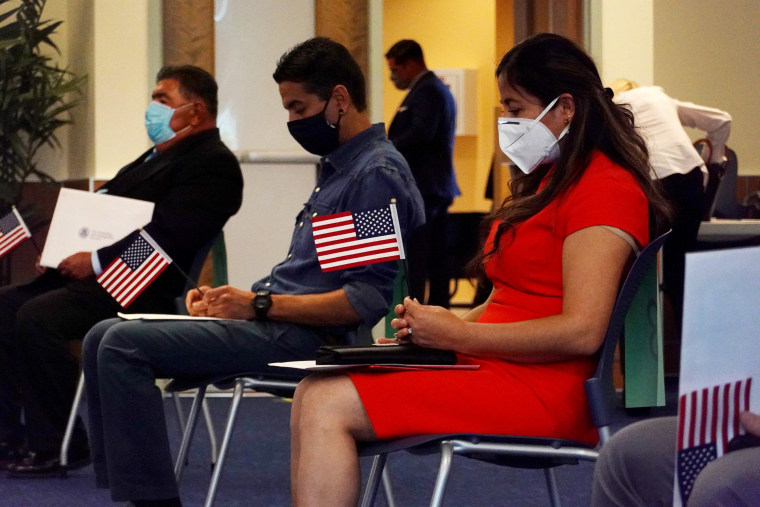WASHINGTON— More than five million Americans, mostly from Latin America and Asia, have become U.S. citizens since 2014, with most of them gaining citizenship since President Donald Trump was inaugurated in 2017.
Two civic organizations launched campaigns this week aiming to register these potential new voters ahead of November's elections.
The campaigns, one from the National Partnership for New Americans (NPNA), a coalition of immigrant advocacy organizations, and the other from the Southern Law Poverty Center (SLPC) group, which monitors hate groups and extremist organizations, are focused on registering new voters in key states, including five in the deep South.
The NPNA, a coalition of 50 organizations, highlighted that new voters can impact the outcome of local and national races in a dozen states, especially in local and state seats in Arizona, North Carolina, Florida, Michigan and Pennsylvania.
According to the NPNA, the number of new citizens between 2014 and 2018 is greater than the 2016 margin of victory in Florida, Michigan, New Hampshire, Pennsylvania and Nevada.
There are up to 5.3 million naturalized citizens since 2014, according to the NPNA, with 3.1 million obtaining citizenship after Pres. Trump's inauguration in January of 2017.
Almost 70 percent of those naturalized between 2014 and 2018 come from Latin America and Asia, and 55.6 percent are women. Most of these new citizens live in California, Florida, New York, Texas, New Jersey, Illinois, Massachusetts, Georgia, Pennsylvania, and Maryland, according to NPNA.
In Florida, the majority of new citizens came from Cuba, followed by immigrants from Haiti, Colombia, Jamaica, Venezuela and Mexico. As a block, the total there, of 415,468, was greater than the margin of victory in the 2016 elections, when Trump beat Democratic candidate Hillary Clinton with a lead of just 112,911 votes, or 1.2 percentage points.
Becoming citizens, mobilizing to vote
Fabiola Landeros, a community organizer at Centro de Igualdad y Derechos (Center for Equality and Rights) in Albuquerque, New Mexico, became a citizen in May of 2019, in part, she said, because her three children were worried she could be deported to Mexico for her activism and civil rights work.
The oldest of three children, Landeros was born in Torreón, Mexico and raised in Ciudad Juárez. After settling in New Mexico, Landeros joined the Center in 2013, shortly after one of her brothers was deported.
"When my brother was deported, I felt that I lost my family, but when I arrived at the Center, I achieved an entire community," said Landeros, who emigrated to the U.S. more than a decade ago.
There are organizations that can help with the registration process, said Landeros, because "we cannot allow another four years" for Trump, she said, and obtaining citizenship "opens up a world of opportunities for us."
Oliva Quintos, an attorney in Houston, Texas, obtained citizenship in 2017. She did so, she told Telemundo News, because “the results of the 2016 elections disappointed me, and I felt responsible because I did not do my part."
“So I decided to apply for citizenship in order to vote in 2018; I realized that change can come not only through street protests but also at the ballot box,” said Quintos, who immigrated from the Philippines thirty two years ago, when she was 8 years old.
"If you don't vote, you are giving up your rights in this country, and I really think it is the most powerful tool we have. We can remove bad politicians from power, and the vote defines the control of the Senate, which is the one that confirms federal judges," said Quintos. "For me it is a catastrophe that they are confirming poorly qualified judges."
The NPNA campaign has a budget of just $250,000, but will also get a boost from local and national strategic campaigns, which will include the participation of celebrities and multilingual advertisements on social networks.
The goal is to "mobilize these voters," especially when there are efforts by Republicans to suppress minority voting, said NPNA President Nicole Malaku during a video conference with reporters.
Malaku was referring to false claims from Pres. Trump about the dangers of expanding vote-by-mail options amid the pandemic. In fact, it's not a new method, and dates back even to the Civil War, as an option for soldiers when they were far from home.
The Alabama-based SLPC launched the “Vote Your Voice” campaign, with an investment of up to $30 million for civic organizations in the South in order to increase voter registration in the next two years.
Its campaign is targeting minorities with historically lower turnout and will focus voter registration efforts in Alabama, Florida, Georgia, Louisiana and Mississippi, both for the 2020 election and for the midterm legislative elections in 2022.
Margaret Huang, president and chief executive of SPLC, explained that the participation of minorities in the polls will not solve the country's problems overnight, but it will be key to "start dismantling white supremacy."
It will not be an easy task, said Huang, considering the COVID-19 pandemic. Minorities, in particular have been disproportionately impacted by the effects of coronavirus.
In the past two years, the SPLC has spearheaded efforts to improve voter turnout in Florida, Louisiana, and Mississippi, in addition to filing lawsuits to curb voter suppression, primarily against minority voters.
The group said it will begin distributing funds next month for nonpartisan activities, with the goal of increasing voter mobilization and education efforts.
An earlier version of this story was originally published in Noticias Telemundo.
